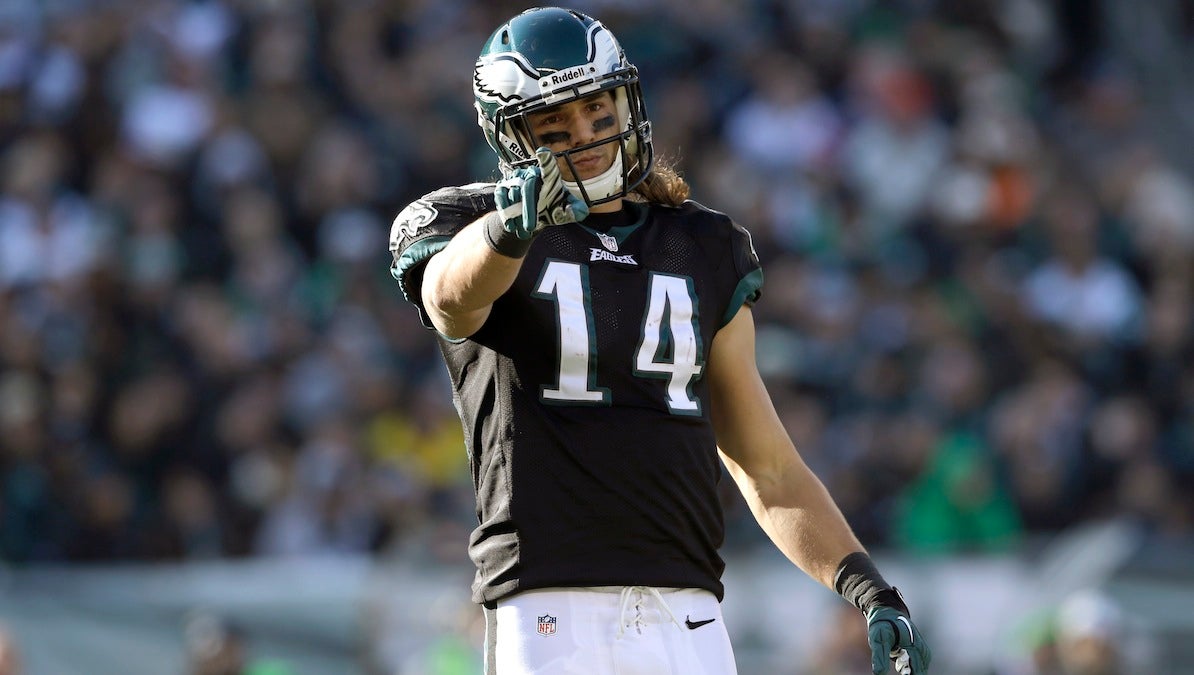Riley Cooper and the N-word
Listen
Philadelphia Eagles' Riley Cooper. (Matt Rourke/AP Photo)
Note: The following article uses racial epithets that some reader’s may find offensive.
Over the past few months, I’ve gained a lot of respect for Riley Cooper. After a video of him using the n-word at a concert last summer went viral, Cooper apologized and assumed full responsibility for the incident. And after a slow start on the field, he has become a favorite target for quarterback Nick Foles on the revived Philadelphia Eagles.
When Foles tied an NFL record on Nov. 3 with seven touchdown passes in a single game, three of them went to Riley Cooper.
But I still think Cooper should have been penalized by the Eagles with more than a fine, and not simply because he said a bad word. Instead, the team should have suspended or cut him for the bigoted context in which he said it. After a dispute with an African-American security guard at the concert, Cooper said, “I will jump that fence and fight every nigger here.”
Cooper’s remark is hateful at its core. It clearly links the guard’s allegedly poor behavior to his race; even more, it associates other people who share the guard’s race with that same behavior.
And that’s been a defining formula for white racists for the past four centuries: If you’re angered or frightened by a black person, trot out the n-word. That’s why South Carolina Sen. Benjamin Tillman threatened to kill “a thousand niggers” after famed black educator Booker T. Washington dined at the White House in 1901. And it’s why, a half-century later, Georgia’s Eugene Talmadge swore that “niggers will never go to a school which is white while I am governor.”
It’s also why white players in the Philadelphia Phillies’ dugout told Jackie Robinson, “We don’t want you here, nigger.” And it’s why a white baseball fan wrote to Hank Aaron that “we don’t want no nigger Babe Ruth” when Aaron was on the verge of breaking Ruth’s home run record in 1973.
But not everyone who uses the n-word does so in a malicious or insulting way. Consider Keith Dambrot, whom you might remember as LeBron James’ high school basketball coach in Akron, Ohio; now he coaches at the University of Akron. But you probably don’t know that Dambrot was fired from a previous coaching job, at Central Michigan University, for using the n-word.
During halftime of a 1993 game, Dambrot — who is white — asked his players for permission to say the n-word. The players assented, so Dambrot said, “We need to be tougher, harder-nosed, and play harder. … We need to have more niggers on the team.”
Dambrot went on to laud one of the team’s three white players as a “nigger” for his effort and hustle. He then categorized other members of the team as niggers or half-niggers: The former were giving it their all, while the latter needed to try harder.
Obviously, Dambrot was using the word as one of praise rather than of hatred. When word got out about his comments, however, none of that mattered. “The term is inappropriate under any circumstances,” the university president intoned, shortly before Dambrot was dismissed.
Under any circumstances? Really? The president must not have heard much contemporary African-American music, where the n-word figures prominently. It has also led to a long internal dispute about whether that’s crude and self-hating (see: Bill Cosby) or therapeutic and uplifting (to rapper Tupac Shakur, “Nigga” stood for “Never Ignorant, Gets Goals Accomplished”).
No matter where you come down on that debate, it’s clear that African-Americans have sometimes employed the term to indict racism in American society. And so have whites. Consider Mark Twain’s The Adventures of Huckleberry Finn, which uses the word “nigger” more than 200 times.
Anyone who has studied the context of the novel — or of Twain’s essay “Only a Nigger,” which attacks lynching — knows that he was deploying the word to satirize racial prejudice. But that hasn’t stopped parent groups from challenging schools that teach Huck Finn, which came in 14th on the American Library Association’s list of the most-banned books of 2000-09.
If any use of the n-word is as bad as any other, we’d have to put Twain’s words in the same foul bucket as Riley Cooper’s. Ditto for Lyndon B. Johnson’s now-famous quip about appointing Thurgood Marshall — not a lesser-known African-American — to the Supreme Court. “When I appoint a nigger,” Johnson told an aide, “I want everyone to know he’s a nigger.”
You might not like Johnson’s choice of words here, but it’s clear that he was trying to give blacks a leg up. Just as clearly, Cooper was slapping them down. That’s why the Eagles should have done more than just slap him on the wrist. At the end of the day, it’s really not about the n-word at all. It’s about who is using it, and how and why.
WHYY is your source for fact-based, in-depth journalism and information. As a nonprofit organization, we rely on financial support from readers like you. Please give today.

